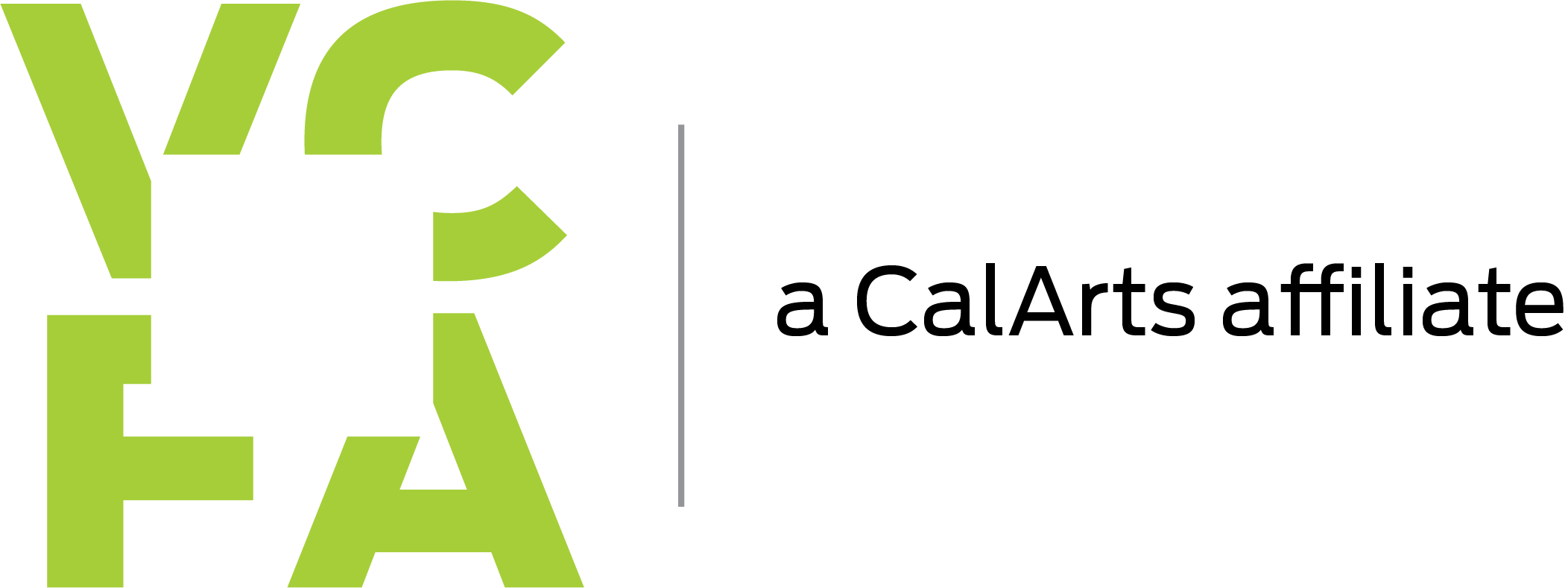FACULTY STORY: Daphne McWilliams
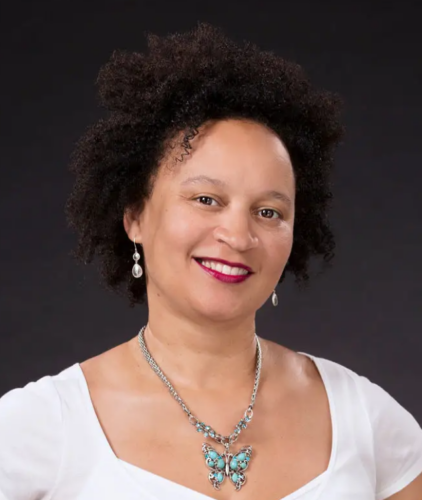 Art has been a home for Daphne McWilliams for her entire life—literally. McWilliams was on a set running scenes as a child actor before she’d even sat behind a school desk. After being in front of the camera, McWilliams produced music videos for prominent artists such as Blues Traveler, the Notorious B.I.G., and Queen Latifah before working with Spike Lee in 1995 on the film 4 LITTLE GIRLS, a project that would change her artistic career and outview.
Art has been a home for Daphne McWilliams for her entire life—literally. McWilliams was on a set running scenes as a child actor before she’d even sat behind a school desk. After being in front of the camera, McWilliams produced music videos for prominent artists such as Blues Traveler, the Notorious B.I.G., and Queen Latifah before working with Spike Lee in 1995 on the film 4 LITTLE GIRLS, a project that would change her artistic career and outview.
McWilliams would go on to produce films like CASE OF CURT FLOOD (Spike Lee, 2011), SLAVERY BY ANOTHER NAME (Sam Pollard, 2012), MAYNARD (Sam Pollard, 2018), BILL TRAYLOR: CHASING GHOSTS (Jeffrey Wolf, 2019), and HBO’s BLACK ART: IN THE ABSENCE OF LIGHT (Sam Pollard, 2021), and would be mentored by renowned film producer and executive Grace Blake (SILENCE OF THE LAMBS, SCHOOL DAZE, THE WIZ). Her latest film, the documentary A BOSTON (R)EVOLUTION (2024), follows the historic 2021 mayoral election in Boston, Massachusetts where the city broke its 200-year-old run of white, male mayors by electing a BIPOC woman to the city’s mayoral seat.
Today, McWilliams has a passion for mentorship, and is sharing her experience with filmmakers like those in the VCFA MFA in Film program. VCFA sat down with McWilliams to talk about her career, A BOSTON (R)EVOLUTION, and her work as a mentor and VCFA MFA in Film faculty member. Read the interview below and learn more about Daphne McWilliams at seventhchildproductions.com. Plus, read her recent interview published with Brooke Berman.
The Interview
Q: How did art enter your life?
A: I can honestly say I have been involved in art my entire life because my father loved music. He loved music. We grew up with music in the house. He wanted me to be an opera singer. And I grew up with art. My love of film is from my father. He would make us watch all the classics. Make us listen to classical music. He would record classical music. We always had instruments. We all took music lessons.
I stepped on a set before I stepped into the classroom.
Q: Your early career included everything from acting to music videos. How did filmmaking come into the multitude of arts in your portfolio?
A: I was producing music videos, and then I worked on 4 LITTLE GIRLS. It just changed my entire outlook not only as a filmmaker, but basically just changed my life. Spike Lee was an incredible person to just watch as he conducted interviews. I mean, I really learned so much on that one job, in addition to producing it. I learned a lot from him about how you approach the people that you’re interviewing, if you’re going into their homes. He just brought such a level of respect and patience. I’m a very curious person, so I would just get excited because he would be talking to these people, and, you know, listening to their personal stories.
In school, you learn about history, but I wasn’t really learning about Black history, except for my older sister, who went to Barnard and would come home and teach us more about what we weren’t learning, not that my parents are ignorant, but they weren’t Americans. I really started understanding racism was when I was an adult, it just made me start putting two and two together about my experiences as a child in school and on set. I grew up on Staten Island, which is—and very especially back then was—very segregated and so racist.
My brothers would get pulled over. There’s eight of us, eight kids in my family—no one has ever been arrested. It meant absolutely nothing, because all they do is see the color of your skin, and that still is like that today.
And then just the tragedy of losing those girls, and the parents sharing those stories [in 4 LITTLE GIRLS]… I don’t really know if I could put into words what it was like. People use that word “profound,” but it really just shifted me. It just changed how I looked at things in life. I’m a very visual person, so it’s almost like you take a puzzle, put all your 1000s of pieces together, and you throw it up in the air, filming it in slow motion, but then you take the first shot of it and all of the pieces coming back together. That is kind of what my world looked like—it was like I thought all the pieces were together, and then it just blew up. Then it started to come back.
So I guess I’m a whole person, but the pieces have moved around, and I don’t really care if all the pieces fit. That’s life—constantly trying to figure out.
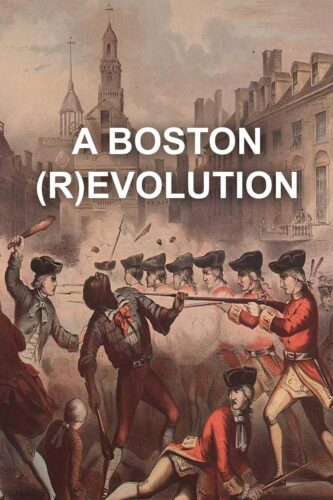 Q: Let’s talk about your most recent film, A BOSTON (R)EVOLUTION. What is it about and what was the inspiration behind the project?
Q: Let’s talk about your most recent film, A BOSTON (R)EVOLUTION. What is it about and what was the inspiration behind the project?
A: Backstory:
Producers Mikaela Beardsley and Jamie Gordon are both from Boston and were intrigued when two non-white women threw their hats into the mayoral ring, intending to take on incumbent Mayor Marty Walsh, given that the city had been run by white men for all of its 200 years. When Kim Janey was appointed to become Acting Mayor, they realized that history had been made and reached out to longtime Bostonian Carole Brennan who had been former Mayor Menino’s press secretary and introduced them to all of the candidates.
How I got involved:
I’m an old friend of Mikaela and Jamie and was the perfect blend of talented Black female filmmaker who was raised in a predominantly white community much like Boston. As a Black woman born and raised in Staten Island, I deeply understood growing up as the Other in a very tight-knit, primarily White community. In fact, during my own high school experience, a race riot broke out in my predominantly white school. I was one of the black students who were placed in the library until they could safely be escorted out and onto a bus. Kids and families were outside, throwing rocks and screaming racial slurs. The same dynamic defines Boston and I embraced this opportunity to explore marginalization from a more objective perspective.
The story shifted from trailing the candidates to interviewing the “Unheard” voices of Boston.
Q: What do you hope the impact of the film will be on audiences?
A: We have a past—a very complicated history in this country—and talking about it or acknowledging it is important.
There was a little bit of a backlash [to the film]. One of our experts said people aren’t really ready to hear it. They don’t want to hear the history and be faced with it. But we’re all in this period together, and everyone’s past is complicated and complex. We’re here right now and we know that certain things are wrong, just on a human level. Like, who wants to be treated unfairly and shitty?
I hope that people don’t think “Oh, another film about race.” I hope they think “These are all people. There should not be violence.”
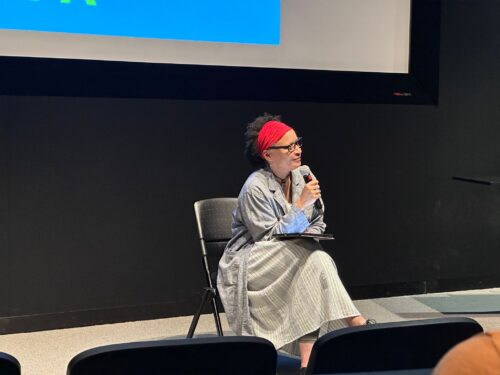 Q: What brought you to the world of teaching and mentorship at VCFA?
Q: What brought you to the world of teaching and mentorship at VCFA?
A: I never really believed that you can manifest things, but now I believe I can, because for a couple of years now I’ve been mentoring, but I wanted to put together a project where I get five budding filmmakers and pair them up with five veteran filmmakers, and they make films. Whatever knowledge I have, I want to be able to pass it on or share it.
It was that right moment in time when [VCFA] was pitched to me, and after the first semester [at VCFA], I was like, oh my god, this is just so amazing. It’s basically what I’ve wanted to do since I retired from producing.
In my first semester, I ended up with three students… and I was nervous. … But this is helping me define who I am, especially in the world of filmmaking and as a mentor. I think I’m very lucky and really fortunate to be part of this VCFA institution. VCFA is growing and changing. I’ve only been here a short time, but it seems like they do hold the students’ best interests, and so do I. I’d like to hope I’m giving my students my all.
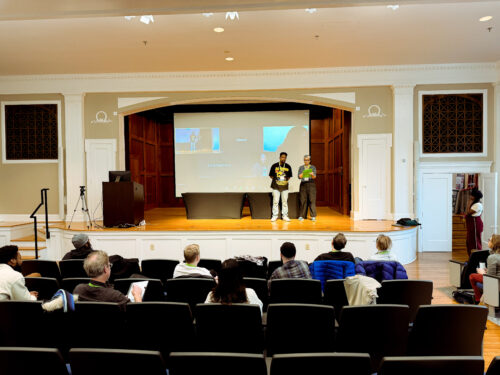 Q: What makes mentorship such an important and vital practice in the world of art?
Q: What makes mentorship such an important and vital practice in the world of art?
A: Mentorship in the arts is more than just passing down skills—it’s an exchange that reaches deeper. In my experience, having a mentor and mentoring others has been both grounding and deeply rewarding. There’s a kind of alchemy in the back-and-forth, where experiences, insights, and stories are shared across generations. This exchange keeps us rooted while pushing us to new edges. In the end, it’s invaluable. It’s the lifeblood that keeps the arts alive and evolving.
Q: What universal piece of advice/mentorship would you give to the filmmakers studying at VCFA?
A: Be mindful when choosing a mentor and do your homework. Don’t just settle for someone in film; sometimes, the best mentors are a bit outside the field. I’ve often found that a person who’s not directly in the film world can bring a fresh perspective or help you see things differently. Whether it’s someone with a totally different background or someone who’s lived through experiences that resonate with your work, the right mentor can open you up to new ways of thinking that go far beyond the film itself.
